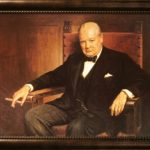I feel a degree of sympathy for the ex-President of the Government in Spain. What can he do on Sundays? His agnostic wife Sonsoles goes off to sing with her church choir, perhaps returns to lunch? I assume his gothick daughters have their own agenda on the Day of Rest: there are cauldrons and incantations; blasted heaths can be found near Madrid. After nearly eight years of solitary power in one of the most important member/countries of the European Union, to be shoved off the throne by a resurrected Rasputin must be, to put it simply, an Ishoo.
Last July socialists celebrated the tenth anniversary of that celebrated XXXV Congress of the Spanish Workers’ Socialist Party in which José Bono was electorily beaten to the post as Secretary General by the unknown chap ‘from León’. But what have they to celebrate? Nine votes separated ZP from Bono, nine votes which changed the history of Spain and seriously affected her destiny. ‘ZP’ by the way meant ‘Zapatero (for) President’.
Until that magic moment, el señor Rodríguez Zapatero had been an invisible, silent figure in Congress, what the English call, not without reason, a backbencher. In common with all modern Socialists, he was born into a standard middle-class family (in Valladolid not León by the way), with a lawyer father who sent him to school with the Jesuits. He passed the necessary examinations and went to study Law at the university in León, where he rapidly became an active socialist. As a worker he became Assistant in the teaching department of Constitutional History during two terms. This is his work experience. He made no doctoral thesis. To him is attributed the title Doctor Honoris Causa by a Peruvian college.
Now that three creaking reels of his celluloid-like career as Premier have wound down, ZP must be lonely. How can he have friends? His first cabinet in 2004 after the calamity of 11 March consisted of eight women and eight men chosen not for talent, but as a symbol of the equality of the sexes. It was political expedient too, placing the Andaluz/Catalan Montilla in the Ministry of the Interior, Trujillo the woman from Extremadura (poorest region in Spain) in Housing, and Carmen Calvo and Magdalena Álvarez in Culture and Development. Following the maxim that men in power should keep friends close by, enemies even closer, Spain got José Bono at Defence, in the second mandate in the Presidential Chair in Congress; Chacón and Jiménez respectively in Congress and as Secretary of State for the Americas, but later the woman Chacón, as a sop to her Catalan independency – the Ministry of Defence though she couldn’t tell a hand grenade from a bowl of chick peas. ZP’s friends Caldera and Jordi Sevilla were appointed and kept at arm’s length. Jesús Caldera had been ZP’s right-hand man in Opposition and during the Election Campaign. He was abandoned in favour of an expensively-dressed and made-up woman obsessed with photography (of herself) called María-Teresa Fernández de la Vega. Miguel Sebástian had expected to collect the portfolio of Finance, but it went to P. Solbes ‘for his greater experience’. Later he got rid of associates with the same ease as he promoted them.
Two years later (crash of thunder, flash of lightning in the wings), Rasputin Rubalcaba entered the political scene. This political expert had been with Felipe González and the GAL, had orchestrated ‘the public’s reaction’ immediately after the 11 March catastrophe; was an acknowledged eminence grise. Working darkly behind screens of his own making, Rubalcaba plotted, planned and connived, ignored criticism, and finally ousted Zapatero in 2011 with a self-proclamation as ‘Leader of the Socialist Party’. Another ex-friend and associate was José Blanco, whose reputation was perhaps not whiter than white; he became involved in shady goings on in a garage forecourt; later vanished from sight. Spaniards will remember Blanco as the right-hand man who never ceased attacking the Right even when they were in opposition and quite powerless. It was just something this uneducated man had to do.
Now Zapatero is alone, friendless despite the wealth Spain provides for the rest of their life to retired Ministers. His Hampton Court, his Kremlin if you prefer, was the Moncloa Palace from 2004 to 2011. Only the most privileged was allowed to approach, and then only with an official pass; notice was passed photographers and cameramen from ‘chosen’ TV stations.
The rictus smile fixed on ZP’s face during the first four years of his seven-year mandate has gone, satanic eyebrows remain. The State Banquets with other Presidents, friendly chats with his King and Queen, opportunities for rhetoric not composed by himself at the international lectern; the flitting to and fro in a state-owned jet, moving smoothly from PSOE’s conference to PSOE’s regional electioneering headquarters; official visits to American Presidents knowing that they loathe him for his rightly infamous insult to the American flag; being left alone at European summits, while the likes of Merkel, Berlusconi, Blair etc. stood apart in a little bunch, snickering about him – all that is over. But is it a relief?
What can be the future for Zapatero? A book or two of course, edited and approved by him; international lecturing as he can well afford the writers; life will go on with his hymn-singing spouse and the Sitwells in their gothick mist. He has his friends: an illiterate president of Bolivia, a dying Caudillo in Venezuela, nonagenerian brothers in Cuba whose time is up . . . Above all he has the example of the Hollywood actor Heath Ledger to contemplate; he, poor boy, following the devices and desires of his own heart, took his own life.









Leave A Comment